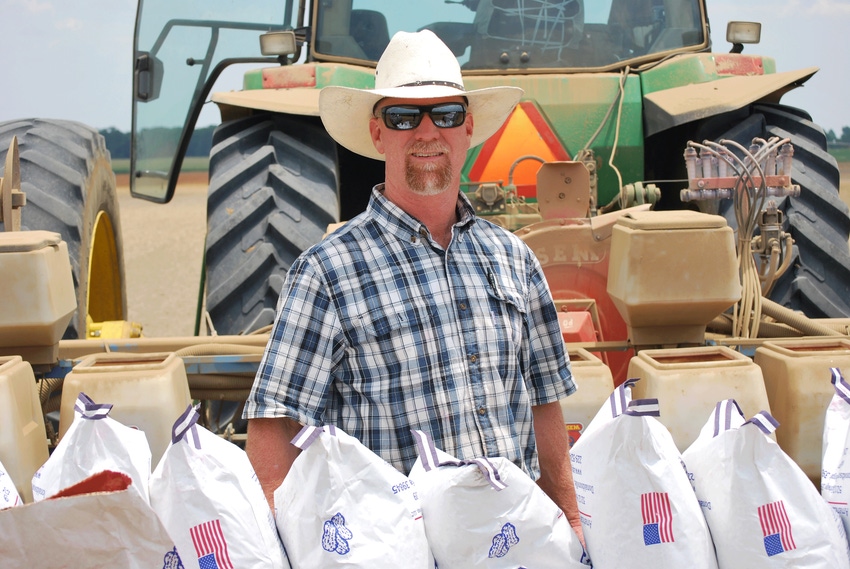
A farmer needs two essential things: (1) a farm, or land to farm, and (2) faith. That’s the simple reason why Matt and Tonya Bryan named their family operation Faith Farms.
They farm (and have faith) in Baker County, Ga., located in the southwest corner of the state — the top runner-type peanut producing region in the U.S. Their hands-on attention to detail, and what Matt calls a “gut-instinct to do things in a conservative way,” has earned Faith Farms the 2016 Farm Press Peanut Efficiency Award for the lower Southeast region.
“When you have a good year, you’d better put something back, because they aren’t all going to be good ones,” says Matt, 48. “You have to have a lot of faith to farm. You sort of have to hope for the best, and plan for the worst.”
He started farming on his own in 1992 with 50 acres of peanuts, 75 acres of corn, and about 40 acres of soybeans — the first and only year he grew “poverty peas,” he laughs.
His father, Bill, didn’t lobby for Matt to become a farmer. It wasn’t that Bill had a problem with farming. He had farmed and done some crop dusting, too, in the 1970s and 1980s. He knew how tough it could be to farm, especially to get started.
But Matt had faith — he just needed a farm. Bill finally agreed to sign a few papers to help Matt get started that first year. Tonya named the farm in 1996.
Today, Faith Farms is about 1,000 acres; this year they have 225 acres of peanuts, 300 acres of corn, and 300 acres of cotton in a corn/cotton/corn/peanut rotation. The Bryans also have 150 mama cows on 150 acres of managed pasture.
| Download this article in .PDF format |
Matt can hit home run yields, and he shoots for at least 2 tons per acre average on peanuts. His irrigated land last year averaged almost 7,000 pounds per acre; one 102 acre field averaged 7,281 pounds.
He admits he isn’t big on buying new equipment, and if what he has is in good working order and getting the job done, he doesn’t have to have the newest and greatest thing.
Except for a few dry corners, Matt’s farm is totally irrigated, something he invested in over the years, especially during the better-than-bad years between 2009 and 2012. On the sandy soils of Baker County, where you can watch a thunderstorm drop heavy on a field in the afternoon and still have drought conditions before breakfast the next day, irrigation is the best insurance, he says.
To make the yields
He plants the Georgia-06G cultivar, and has for several years. The variety easily added an 800-pound yield bump. He has twin-rowed his peanuts since 2000, and the plow doesn’t stay parked on Faith Farms. “I believe in breaking land,” Matt says.
He uses a Monosem planter and applies Thimet at planting. He had additional insecticide applications in 2015, using Besiege and Grizzly.
For weed control last year, he sprayed Sonalan, Valor, and Cadre, and kept fields cleaned up later, as needed, with 2,4-DB. Pigweed escapes anywhere on the farm are hand pulled to keep the seed bank down.
Diseases are well-established in the area. Last year he banded Proline and sprayed Provost, Folicur, and chlorothalonil, and used a two week application schedule, stretching time between applications depending on conditions.
Though the soil is sandy with some nematode pressure, levels haven’t yet been enough to treat with a nematicide.
“We do what we have to do to make the yields we need,” Matt says. “We have to do that. But slow and steady seems to work best, at least for me.”
He has one full-time employee, Bubba Craft, who has been working with him for many years, and his brother, Will, helps from time to time.
He markets his peanuts through the American Peanut Growers Group at Donalsonville, Ga. He is a member owner in the farmer-owned group, which started in 2002 following the end of the federal peanut quota system.
The Bryans have three children: Rebeka, 18, Jacob, 16, and John, 13. The two boys show interest in being farmers one day, Matt says, noting that they’re now at the age to really contribute labor to the operation. The 1,000-acre farm is enough for the family for now, but some expansion will be in order in the next few years to help the boys get started with their own farming careers — something Matt says he’s not going to hinder.
“It’s a good life, but it’s got to be in your blood to make it work,” he says.
And with that, on a late May day, he climbed back into his tractor to finish planting his peanuts.
About the Author(s)
You May Also Like







